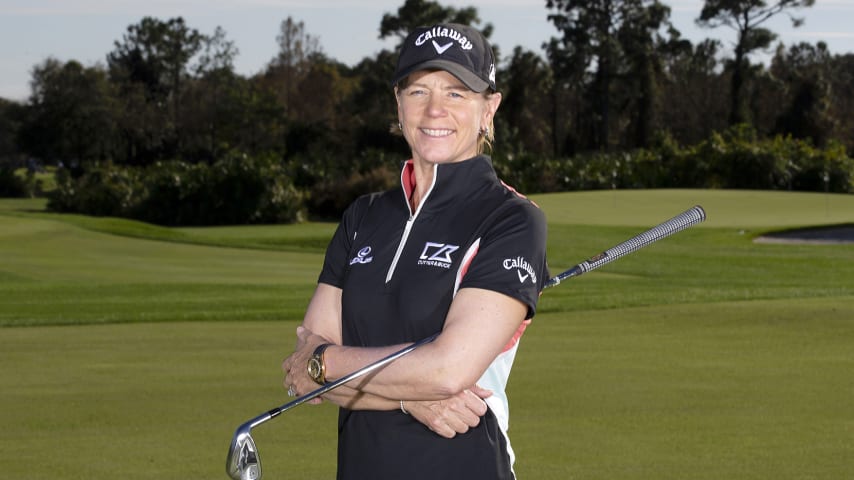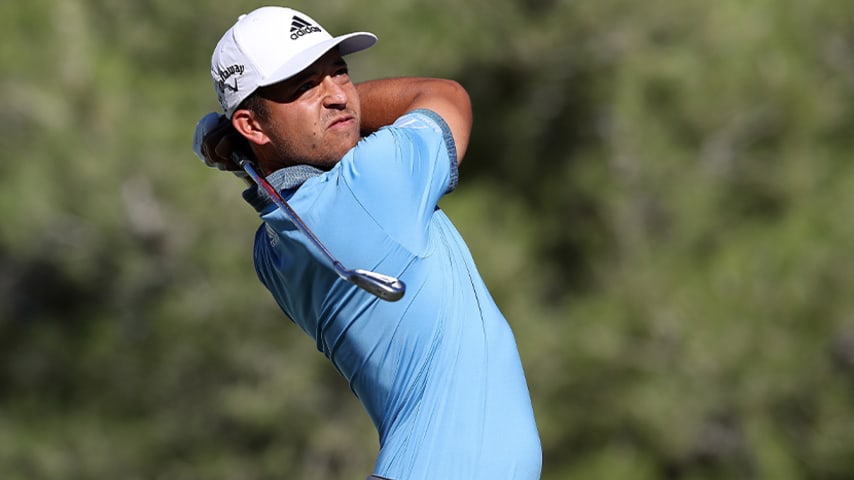Annika Sorenstam, now 50, reflects on a remarkable career
9 Min Read

ORLANDO, FLORIDA - JANUARY 08: Hosts of Scandinavian Mixed tournament, Henrik Stenson and Annika Sorenstam pose for portraits during a photocall on January 08, 2020 in Orlando, Florida. (Photo by Michael Reaves/Getty Images)
Written by Helen Ross
She’s won 89 times around the world, including 10 major championships, and shot the only 59 in LPGA TOUR history. She’s a member of the World Golf Hall of Fame, too.
But Annika Sorenstam never expected to be chosen, along with Gary Player, to receive the Presidential Medal of Freedom, which is the highest civilian honor in the United States. Unfortunately, though, the COVID-19 pandemic has postponed the ceremony, originally scheduled for March, indefinitely.
Sorenstam learned of the honor after a round of golf with President Donald Trump at Trump National in Washington, D.C., last fall. She calls it a very “surreal” and “humbling” experience. She and Player join Arnold Palmer, Jack Nicklaus, Charlie Sifford and Tiger Woods as the only golfers receiving the medal.
The golfer, philanthropist, businesswoman and mother of two reached another milestone last Friday when she celebrated her 50th birthday. Earlier this year, she took time out for this Q&A with PGATOUR.COM.
PGATOUR.COM: As you look back on your career, do you have a favorite memory?
SORENSTAM: I have a lot of fun memories. I'm lucky in the way I can say that. Just thinking of some of the things that are mentioned, playing with the men, shooting 59, being part of the Solheim Cup was amazing, winning my first major in Colorado Springs. There's a lot of these things, a lot of things that I feel like I go back, and it makes me smile. ... Just things like that, it's like, ‘Wow, that was pretty cool. Wow, that was cool.’ And having low scoring averages, and then you think of where does golf take you -- the Colonial or the ESPYs. I feel very lucky to be able to have experienced that, and the people that you meet along the way in pro-ams or other athletes that inspire you.
PGATOUR.COM: Do people still ask you about playing against the men at Colonial? And if so, what do they want to know about it?
SORENSTAM: A lot of it is still ‘Why? Why did you do that?’ And then also just ‘How do you handle just being in an uncomfortable situation? Being in a place where you're like never been?’ And people have opinions on it. Most of it was positive, but it's always one or two that always wonders, the naysayers and how do you handle with that, and sticking on your path. So again, this is my story, it's my experience. No right or wrong, but I always tell people is ‘If I wouldn't have done that, I've still to this day would not know what it would be like, and I think I would be mad at myself for not having the courage to try.’
PGATOUR.COM: Who are the people that most impacted you?
SORENSTAM: It always starts at home, I think. It always starts there, and my parents have been very supportive and loving and giving me the resources. I have a younger sister. We challenged each other in different sports. And then just along the way, people in the national team and other players that I looked up to, role models. And then just the people that surround you. I'm one of those that look, I learn a little bit from everybody because people say, ‘Well, who's your favorite player?’ And I say ‘You know I really don't have a favorite.’ But if I can dissect a lot of people ... growing up it was Seve Ballesteros for short game, I would love to have that. And then you looked at, and the reason I had already earlier, because we didn't have the women's coverage or women's golf that didn't exist, really. So, I grew up, it was Greg Norman, he had the power. And then you had Bernhard Langer who had the perseverance, and he was the patient guy. He was the just-keep-on-going-never-give-up (guy). So, right there you had quite the players if you put those three together.
And then I remember reading about Nancy (Lopez), and she was very much like Mr. Palmer, like the character, and then you had the ultimate competitor with Mr. Nicklaus. And then when I came to college, I was exposed to Betsy King, Patty Sheehan, Pat Bradley, Meg Mallon and Beth Daniel, all of them. And I was like, ‘Wow, these players are really good.’ And that's when things were starting to be more real. ...
So, the same thing when I stepped away, role models. I saw what Mr. Palmer did, especially in Orlando because we live in Orlando, what he did from a philanthropy perspective was amazing. And then you also look at him from a business side, ... I just pick up here and there. But I think what was really interesting to me when I stepped away is there was really not a woman that turned her sport into a business. So, we did a little survey, and I mean, at the time it was Chris Evert, she had a tennis school, but there really wasn't anybody like the names I mentioned, like Greg Norman with his business empire, or John Elway.
And I was like, that intrigued me. It's like, ‘Why don't women turn that into?’ You know what I mean? It was not that many. I mean, Serena (Williams) now has done (it), and Maria Sharapova now, but that's only been the last few years ago. So, it was interesting. So, then I was a little bit determined, like, ‘Come on why couldn't women make sports into being ambassadors? Or why can't they start a business or do different things like the guys do?’ And you still don't see many doing it.
PGATOUR.COM: What keeps you busy now off the golf course?
SORENSTAM: I love spending time and seeing the kids grow up, and spending time and exploring their desires, and in time to help them along their journey as far as just teaching them a little etiquette and so forth. But I love spending time in the foundation. The golf course design has been up and down. I really enjoyed working on my projects, but it's like they come and go, especially times like this. ... I enjoyed working with Mr. Palmer at the Royal Golf Club in Minnesota. That was really fun. And then I've enjoyed doing the design with Cutter & Buck, and I don't know, I've been lucky. I feel like I've been nibbling a little bit here and there, a little bit of TV commentating for fun.
I enjoy being on the World Golf Hall of Fame selection committee. ... I like the variety, I really do, because my foot is still in the game, whether as a board member on the NGF, where we talk a lot about the game and the growth and statistics and so forth, I enjoy that. And then my corporate partners, I go from spending time with Callaway, to MasterCard, to Rolex, and then the following week is the foundation events. So, it's really been fun. And then staying at home and family and sharing those memories. So, I'm not complaining, my life is good. I know right at the moment that it's obviously very different for everyone, and I feel for that. But I think we'll get back to where we were and get back on track. And these times makes you appreciate the life that you have, and the work that you have.
PGATOUR.COM: When did you decide you wanted to make this commitment beyond the competitive part of the game?
SORENSTAM: It just happened naturally and organically, in the sense that I just felt that my career was coming to an end, because I just didn't have it anymore. I had achieved my goals and I wasn't as hungry as I used to be, and I felt like I'd reached my full potential. I mean, I couldn't get any better. And what I mean by that, it's not like I played every day great. But my tops, I know my peaks were, those were my peaks, if you know what I mean? And that was what drove me to play better golf. And when I felt like I had reached my peak, I was like ‘Well, I can't practice anymore, and I know that it's just not in me. I can't get any better.’
So, then you lose that excitement, and I started to think about other things that would excite me. And one of those things were just ‘How can I inspire others?’ I was 37 years old and I'd been around for a while, and you start looking at the game, and how can I say thank you for the game, and you just like, ‘You know what? I want to spend time on the next generation. I want to spend time on other young girls, because that's where I was at that time 15, 20 years ago.’ ... And I felt like I had a story to tell, because I come from a country where you might say, well, golf is not the No. 1 priority or sport.
I was quite shy growing up and still am, and so it was just the story of being able to, how do you just live your dream? How do you fulfill your desires? And how do you push yourself to different level? And playing with the men, I felt like I had a story to tell there. A story to tell shooting 59, and obviously with my records on the LPGA. How do you become the best in the world? How do I share that, the journey, the mindset and all of those things?
PGATOUR.COM: In just 13 years, the ANNIKA Foundation has impacted thousands of young women. That must be very satisfying.
SORENSTAM: It's been really rewarding to be able to give back, to be able to share these experiences and the knowledge, and the purpose with our foundation is obviously to mimic my life in the sense that it's global, it's competitive, it's more than golf and it's creating opportunities. And that's what we try to do, is to do that with our foundation. And do the same thing, the journey I took. That's why we are in Latin America, that's why we are going to New Zealand, or China or Europe.
And then we have our top events here in the U.S., and we have coaches coming there, scouting, hoping that these young girls get opportunities to play somewhere that they want to play. And it's been a fun ride. And it's been amazing to watch these young girls .... Obviously when you look at it like that it makes you feel like you're super old, but then again time flies, and it's fun to be able to give other young girls the opportunity, and that's really what it is. And many of them don't go on and play professional, but that's the thing. That's where we have more than golf, it's creating young, confident women, who pursue their dreams or whatever it is.












